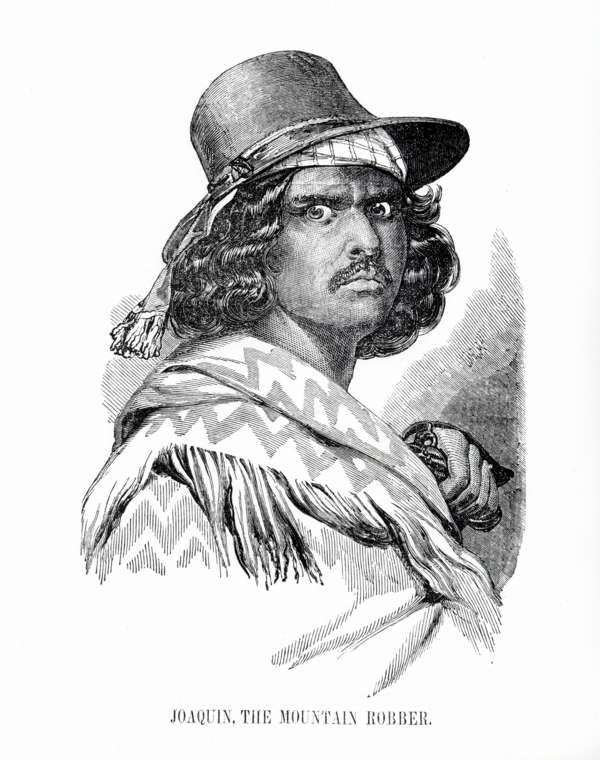The US West is literally littered with Basque names. Basques came directly to herd sheep, but they also came earlier as part of the Spanish Conquest. One part of the conquistador legacy is the surnames that abound not only in the US but in other parts of the Americas. Murrieta, a name that possibly means “a place full of hazelnuts.” Though I doubt he knew where his name came from, Joaquin Murrieta terrorized California and was maybe the inspiration for the literary and movie character Zorro.

- There is a lot that is uncertain about Murrieta’s early life. Most likely, he was born/baptized sometime in the 1820s in Sonora, Mexico. In 1848 or 1849, he emigrated with his wife to California, only a year or two after the region had become part of the United States (it was, of course, part of Mexico before that). While Murrieta had some luck in the gold rush, he lost his claims in various encounters with Americans. The stories vary, from his stepbrother being hanged and him being whipped, to his wife being raped and killed (or maybe none of this happened…). Whatever the details, this seems to have driven Murrieta into the life of a bandit and outlaw.
- Murrieta and his gang became notorious in California. They were horse traders but also murdered miners and settlers, particularly those involved in the gold mines. The Californian government hired a crew of 20 Rangers to hunt the gang down. The Rangers eventually killed a man they claimed was Murrieta. To prove it, they had taken his head, preserving it in alcohol, and were rewarded for their actions. However, years later, people started claiming that the head wasn’t Murrieta’s, that he had escaped…
- Because his banditry grew out of the injustices he had experienced, some viewed him, even back then in the 1850s, as some sort of “rebel with a cause.” (Though, many saw him as simply greedy and depraved.) He seems to have encouraged this view, depicting himself as some kind of avenger against the unjust Americans. This romanticization of his life eventually seems to have inspired the story of Zorro. Indeed, Murrieta was known by several nicknames, including “The Headless Horseman,” “El Coyote,” “The Mountain Bandit,” “El Patrio,” and “El Zorro.”
- In his 1919 novel, The Curse of Capistrano, Johnston McCulley (who had his own troubled past) introduced his character Zorro. Set in the Pueblo of Los Angeles, Zorro’s adventures pitted him against corrupt officials on behalf of the commoners and indigenous people of the village. Zorro was known for wearing a mask and having a dual identity, inspiring in some part the idea of the superhero to debut in comic books a few decades later. Zorro is said to have been based, in part, on the romantic view of Murrieta as a defender of locals against the aggression of the Americans (though another Californio bandit, Salomon Pico, is also thought to be an inspiration). Indeed, in the movie The Mask of Zorro, staring Antonio Banderas, (a second generation) Zorro is really Alejandro Murrieta, the brother of Joaquin who becomes Zorro to avenge his brother’s death.
Primary sources: Santurtzi Historian Zehar; Wikipedia; HistoryNet.com; Stephen Andes’ Zorro’s Ghost.


Ps our earliest amoral has a green background with clearly hazle trees as part of our symbology veriius versions exist some with a dog some with a dragon ect. We were always outlaws way back. Land barons gold silver and mercury miners horse breeders winery people explorers trubidores lol. Od love to be I’m a conventional exchange of you want
Your description of him as ¨greedy and deprived¨ as well as casting doubt on his reasons for rebelling leans towards the biased Anglo American narrative of him. Keep in mind that Joaquin Murieta was of Basque ancestry, and when faced with injustice acted as any true Basque would by defending his honor and adding California indigenous people who were being murdered my greedy and deprived Anglo Americans. I argue that Joaquin Murieta typifies the Baqsue moral character by refusing to acquiesce to oppression.
Thanks for the note! I’ll just say that it wasn’t my description, that was the description of some people at the time he lived. That’s why I provided a link to the source. I also tried to say some saw him as a justified rebel, as that seems to be the balance of the opinions at the time. It also isn’t clear if he had any realization of his Basque ancestry.